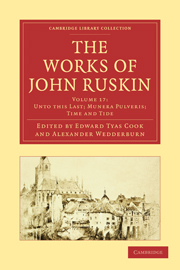Book contents
- Frontmatter
- Contents
- LIST OF ILLUSTRATIONS
- INTRODUCTION TO THIS VOLUME
- PART I “UNTO THIS LAST” (1860)
- PART II “MUNERA PULVERIS” (1862, 1863)
- BIBLIOGRAPHICAL NOTE
- CONTENTS
- PREFACE (1872)
- TEXT (WITH ADDITIONAL PASSAGES FROM THE ESSAYS IN “FRASER'S MAGAZINE”)
- PART III “TIME AND TIDE, BY WEARE AND TYNE” (1867)
- APPENDIX: LETTERS AND PAPERS ON ECONOMIC SUBJECTS 1863–1873
- Plate section
PREFACE (1872)
Published online by Cambridge University Press: 05 November 2011
- Frontmatter
- Contents
- LIST OF ILLUSTRATIONS
- INTRODUCTION TO THIS VOLUME
- PART I “UNTO THIS LAST” (1860)
- PART II “MUNERA PULVERIS” (1862, 1863)
- BIBLIOGRAPHICAL NOTE
- CONTENTS
- PREFACE (1872)
- TEXT (WITH ADDITIONAL PASSAGES FROM THE ESSAYS IN “FRASER'S MAGAZINE”)
- PART III “TIME AND TIDE, BY WEARE AND TYNE” (1867)
- APPENDIX: LETTERS AND PAPERS ON ECONOMIC SUBJECTS 1863–1873
- Plate section
Summary
1. The following pages contain, I believe, the first accurate analysis of the laws of Political Economy which has been published in England. Many treatises, within their scope, correct, have appeared in contradiction of the views popularly received; but no exhaustive examination of the subject was possible to any person unacquainted with the value of the products of the highest industries, commonly called the “Fine Arts”; and no one acquainted with the nature of those industries has, so far as I know, attempted, or even approached, the task.
So that, to the date (1863) when these Essays were published, not only the chief conditions of the production of wealth had remained unstated, but the nature of wealth itself had never been defined. “Every one has a notion, sufficiently correct for common purposes, of what is meant by wealth,” wrote Mr. Mill, in the outset of his treatise; and contentedly proceeded, as if a chemist should proceed to investigate the laws of chemistry without endeavouring to ascertain the nature of fire or water, because every one had a notion of them, “sufficiently correct for common purposes.”
2. But even that apparently indisputable statement was untrue. There is not one person in ten thousand who has a notion sufficiently correct, even for the commonest purposes, of “what is meant” by wealth; still less of what wealth everlastingly is, whether we mean it or not; which it is the business of every student of economy to ascertain.
- Type
- Chapter
- Information
- The Works of John Ruskin , pp. 131 - 146Publisher: Cambridge University PressPrint publication year: 2010First published in: 1905



